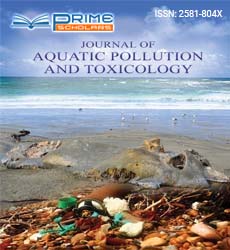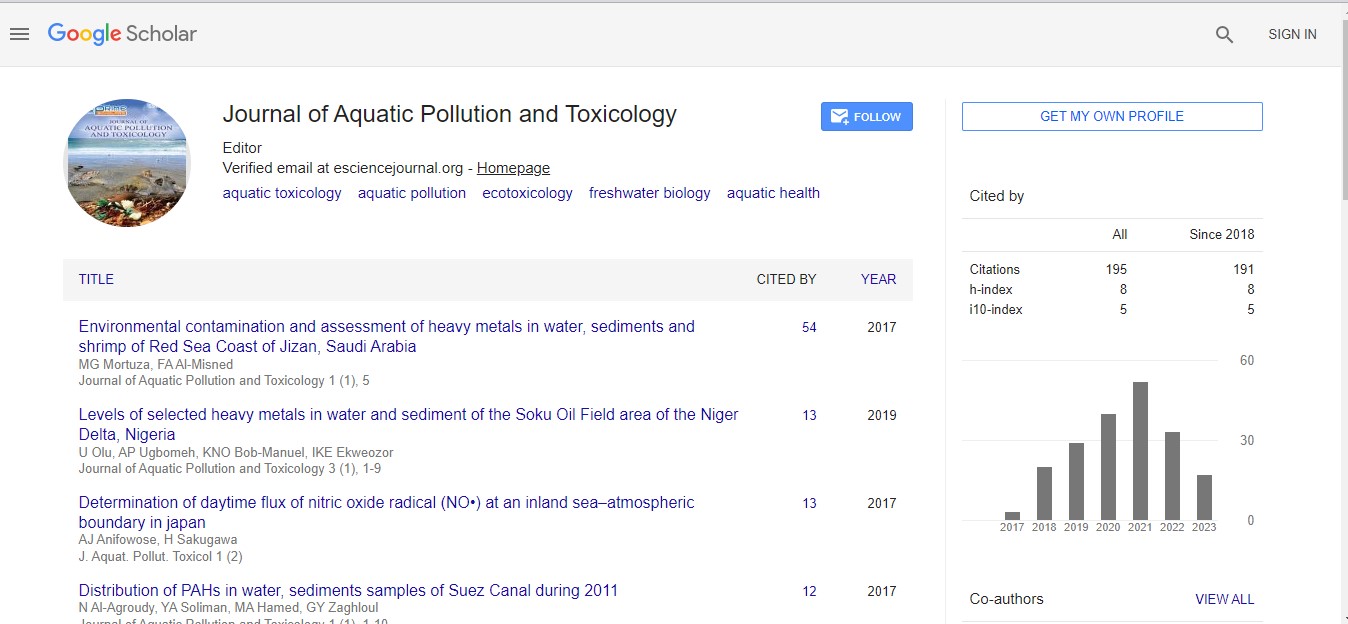Commentary - (2023) Volume 7, Issue 4
The Silent Crisis Unveiling the Significant Contributor Menace of Water Pollution
Alexis Hicks*
Department of Oceanography Sciences, Tulane University, USA
*Correspondence:
Alexis Hicks,
Department of Oceanography Sciences, Tulane University,
USA,
Email:
Received: 29-Nov-2023, Manuscript No. IPJAPT-24-18917;
Editor assigned: 01-Dec-2023, Pre QC No. IPJAPT-24-18917 (PQ);
Reviewed: 15-Dec-2023, QC No. IPJAPT-24-18917;
Revised: 20-Dec-2023, Manuscript No. IPJAPT-24-18917 (R);
Published:
27-Dec-2023, DOI: 10.21767/2581-804X-7.4.32
Description
Water, the elixir of life, is essential for the sustenance of all
living beings on Earth. However, the alarming rise in water
pollution has cast a shadow over this precious resource,
posing a severe threat to ecosystems, human health, and the
planet’s overall well-being. This article aims to shed light on the
pervasive issue of water pollution, its causes, and the urgent
need for comprehensive solutions. Water pollution is a complex
problem with multiple sources contributing to its escalation.
One of the primary culprits is industrial discharge. Factories
release a cocktail of toxic chemicals and heavy metals into
water bodies, contaminating them and disrupting the delicate
balance of aquatic ecosystems. Agricultural runoff is another
significant contributor, as pesticides, fertilizers, and herbicides
make their way into rivers and lakes, causing harm to aquatic life
and posing health risks to humans who consume contaminated
water or seafood. Urbanization and improper waste disposal
play a pivotal role in exacerbating water pollution. Urban areas
generate vast amounts of domestic and industrial waste, much
of which finds its way into water bodies. Plastic pollution, in
particular, has reached epidemic proportions, with rivers and
oceans becoming dumping grounds for single-use plastics
that take centuries to decompose, causing irreparable harm
to marine life. The consequences of water pollution are dire
for aquatic ecosystems. Contaminants alter the physical and
chemical properties of water, leading to oxygen depletion,
acidification, and eutrophication. These changes can result in
the death of fish, aquatic plants, and other organisms, disrupting
the food chain and compromising the overall biodiversity of
water bodies. Moreover, the accumulation of pollutants in
sediments and tissues of aquatic organisms poses a threat to
the health of species and can lead to bio-magnification, where
toxins become more concentrated as they move up the food
chain. This not only jeopardizes the survival of aquatic life
but also poses a significant risk to human health, especially
for those who rely on contaminated water sources for their
daily needs. Water pollution has far-reaching implications for
human health. Consuming contaminated water can lead to
waterborne diseases such as cholera, dysentery, and typhoid,
causing widespread illness and even death in vulnerable
populations. In addition, the presence of pollutants in drinking
water sources has been linked to long-term health problems,
including cancer, reproductive issues, and developmental
abnormalities. Addressing water pollution requires a concerted
effort from governments, industries, and individuals. Stringent
regulations and enforcement mechanisms are crucial to
curbing industrial discharges and agricultural runoff. Investing
in advanced wastewater treatment technologies and
sustainable agricultural practices can significantly reduce the
influx of pollutants into water bodies. Public awareness and
education also play a pivotal role in preventing water pollution.
Individuals can contribute by adopting eco-friendly practices,
reducing plastic usage, and participating in community cleanup
initiatives. Governments should prioritize the development
of comprehensive waste management systems to ensure
proper disposal of domestic and industrial waste, mitigating
the impact of urbanization on water quality. Water pollution
is a silent crisis that demands urgent attention and concerted
efforts from all stakeholders. The health of our planet and
the well-being of future generations depend on our ability
to address this pervasive issue. By implementing effective
policies, embracing sustainable practices, and fostering a
collective commitment to environmental stewardship, we can
work towards preserving the purity of our water resources and
safeguarding the delicate balance of our ecosystems.
Acknowledgement
None.
Conflict Of Interest
The author declares there is no conflict of interest in publishing
this article.
Citation: Hicks A (2023) The Silent Crisis Unveiling the Significant Contributor Menace of Water Pollution. J Aquat Pollut Toxicol. 7:32.
Copyright: © 2023 Hicks A. This is an open-access article distributed under the terms of the Creative Commons Attribution License, which permits unrestricted use, distribution, and reproduction in any medium, provided the original author and source are credited.

